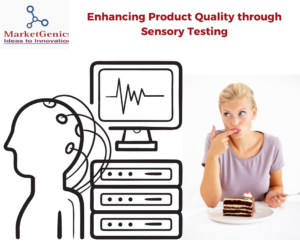Ensuring the highest quality is crucial in the competitive landscape of consumer products and product development. Sensory testing is a crucial step in this quality assurance procedure. Through sensory testing, businesses can learn important information about how consumers feel about their products, which helps them make formulation changes and enhance flavor, texture, scent, and overall appeal. We’ll dive into the field of sensory testing in this blog article, discussing its value, applications, and advantages in product development and research.
This scientific approach assesses and quantifies how people react to various sensory stimuli, including taste, smell, texture, appearance, and sound. Businesses are better able to evaluate the sensory qualities of their products and comprehend customer preferences when they involve human senses.

Through rigorous sensory testing procedures, MarketGenics.co, the best Market Research Company specializes in helping businesses understand consumer perceptions and preferences. The company is dedicated to providing unmatched insights and actionable data.

MarketGenics India is a MRSI certified company.
Send us your resume at
info@marketgenics.co
© 2025 MarketGenics India Pvt Ltd.; All rights reserved